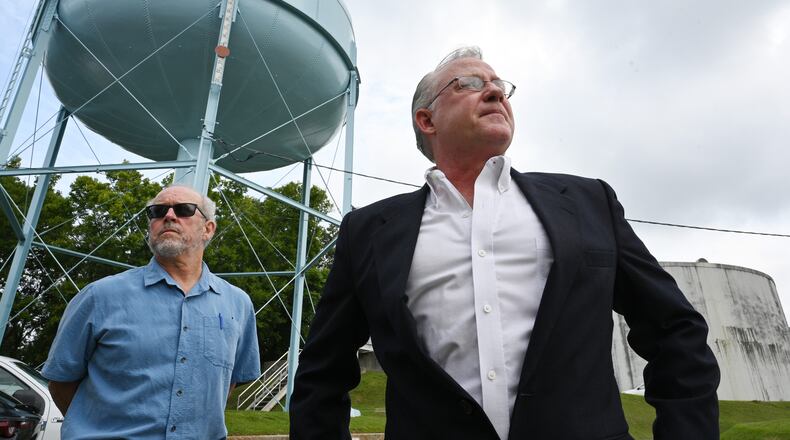The city of Rome has tentatively agreed to settle a high-stakes lawsuit over the contamination of its water supply with so-called ‘forever chemicals,’ which the city alleged was caused by neighbors upstream involved in Dalton’s massive fabric industry.
The exact terms of the settlement are still being ironed out and the agreement must be approved by Floyd County Superior Court Judge Bryan Thomas Johnson. When the settlement is finalized, it will resolve one of Georgia’s biggest legal fights over the dangerous chemicals, known formally as per- and polyfluoroalkyl substances, or PFAS.
The agreement comes days before a trial in the case was set to begin next week on June 5.
Rome’s lawsuit centered around the city of Dalton’s provider of electricity, gas, water and wastewater services — Dalton Utilities — which the plaintiffs said had accepted PFAS-laden wastewater for years from fabric plants in the region.
Rome alleged that Dalton Utilities’ treatment processes were incapable of removing the chemicals, and that a vast, 9,600-acre site where the utility has sprayed wastewater for years has become saturated with astronomical PFAS concentrations. The suit claimed that runoff from the site was sending dangerous levels of the chemicals downstream into the Oostanaula River, the city of Rome’s main drinking water supply.
Credit: HYOSUB SHIN / AJC
Credit: HYOSUB SHIN / AJC
In 2016, in order to meet new federal drinking water standards, Rome stopped drawing water from the Oostanaula and began temporarily relying on a smaller pump station on the Etowah River. The city is working on a permanent solution — a new, $100 million reverse-osmosis water treatment plant — and has raised residents’ water bills to cover the cost.
Rome’s suit sought to hold Dalton Utilities — plus the chemical and flooring manufacturing giants 3M, Chemours, Shaw, Mohawk Industries and others — responsible for paying for the plant, plus other damages.
Andy Davis, the city of Rome’s attorney, stressed that while details of the plan are still being finalized, the city of Rome would proceed with building the new water plant it needs to provide “clean, safe drinking water.”
“This is a great day for Rome,” he added.
The agreement does not necessarily mean the defendants in the case have admitted guilt.
Dalton Utilities’ spokeswoman Kay Phillips confirmed its attorneys were working on the settlement details. She said the utility would not comment on the particulars.
Carolyn LaViolette, a spokeswoman for 3M, said in a statement that the company would “continue to fulfill our PFAS remediation commitments and address litigation by defending ourselves in court or through negotiated resolutions, all as appropriate.”
Mohawk, Shaw and Chemours did not immediately respond to a request for comment.
The parties are set to hold a video conference with Johnson on Friday afternoon to discuss their settlement proposals.
“Forever chemicals” have been used for decades to add oil-, water-, and heat-resistance to dozens of products — from pans and food wrappers to fabric and carpets. Their resistance to break down means traces can be found nearly everywhere on Earth.
PFAS are found in the blood of most people in the U.S., federal research shows, and the chemicals have been detected in even the most remote corners of the world. A mounting body of evidence has linked exposure to minuscule amounts of the chemicals to an array of illnesses: cancers, immune system suppression, elevated cholesterol and decreased infant and fetal growth.
The federal Environmental Protection Agency (EPA) recently proposed new drinking-water standards for perfluorooctane sulfonic acid (PFOS) and perfluorooctanoic acid (PFOA), two “forever chemicals” linked to a host of health conditions. Manufacturers have stopped using the two chemicals, but their resistance to breakdown in nature means they can remain in the environment for decades.
At least one other case involving Rome’s PFAS pollution remains unresolved.
A lawsuit filed by Rome resident Jarrod Johnson is seeking class-action certification with other Rome water customers, but the U.S. District Court overseeing the case has not ruled on that request. It was unclear if the city of Rome’s agreement would affect the trajectory of the Johnson case.
About the Author
Keep Reading
The Latest
Featured




